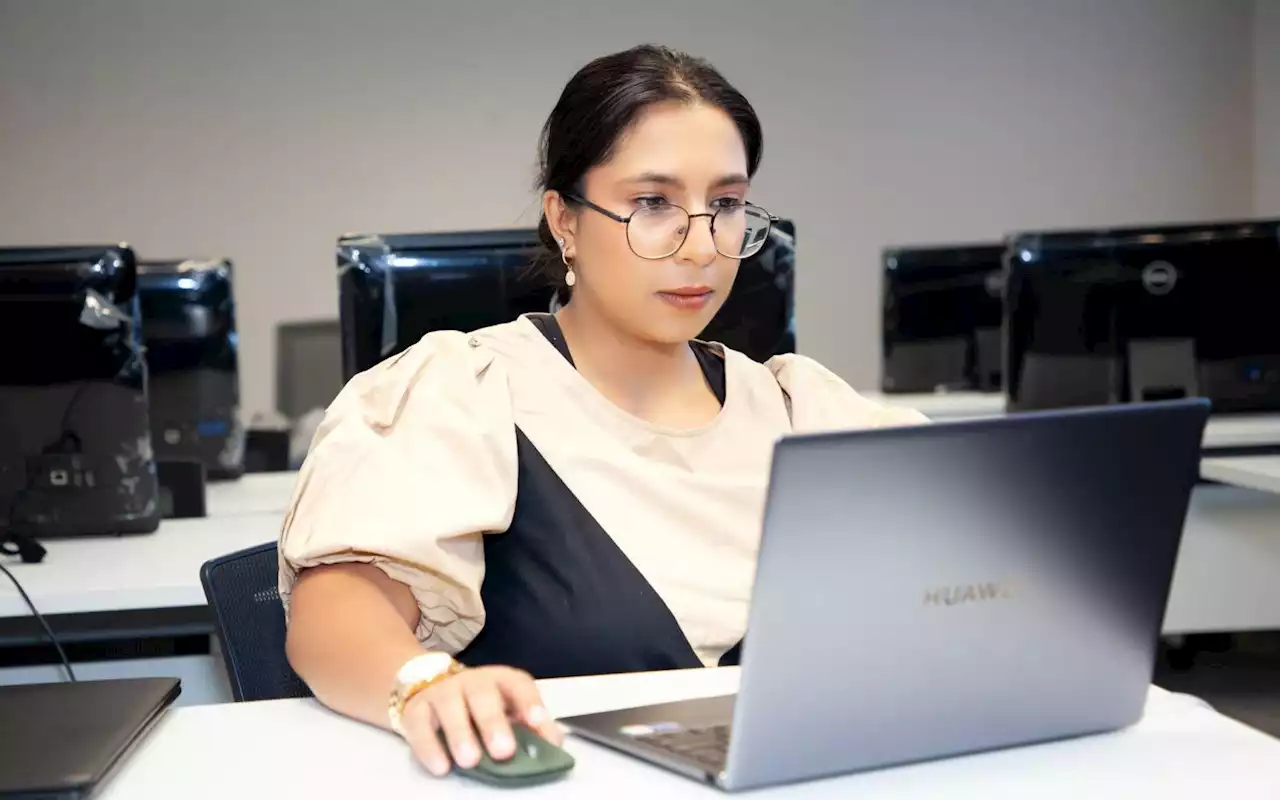SPONSORED: HuaweiSAR is spotlighting young women who are building ICT careers; Rumaanah Khan was selected for Huawei’s skills development learnership programme for people with disabilities, and she has landed a position as an IT consultant at WITS.
As the world celebrated International Girls in ICT Day on 27 April, it’s important to put the spotlight on those young women who are building ICT careers for themselves even in the face of major challenges. One such young woman is Rumaanah Khan, 22, who spent her life striving for excellence and working to make her close-knit family proud. She is now reaping the rewards of her hard work and is making the most of the opportunities made available to her.
Wits University cyber security department. Twelve months later, Khan landed a fixed term contract position at Wits as an IT consultant. Huawei’s programme has been running successfully for six years. Khan was taken on to the 2022 programme in April 2022 and worked at Wits while studying simultaneously for her CompTIA 1101 qualification ; she is currently working on 1102. Thozama Matlhapa, Huawei’s Skills Development Facilitator, says: “This learnership programme identifies young, talented people with a passion for the technology sector.
Khan says the fourth industrial revolution is a massive growth opportunity for herself as well as for South Africa and the African continent. “The 4IR has kicked us into a higher gear and involves a number of disruptive technologies.”
South Africa Latest News, South Africa Headlines
Similar News:You can also read news stories similar to this one that we have collected from other news sources.
 MYSA | Local Hero: Phumzile encourages young people to take up STEM subjects | City PressPhumzile Mbele is offering classes for pupils in Orange Farm so that she can be a part of the solution when it comes to encouraging them to love and take up STEM subjects.
MYSA | Local Hero: Phumzile encourages young people to take up STEM subjects | City PressPhumzile Mbele is offering classes for pupils in Orange Farm so that she can be a part of the solution when it comes to encouraging them to love and take up STEM subjects.
Read more »
 After 100 years in law, women legal practitioners call for equality, fair representation | News24Women in the legal fraternity commemorated the centenary of the Women Legal Practice Act of 1923, which paved the way for women to join the legal fraternity in the country.
After 100 years in law, women legal practitioners call for equality, fair representation | News24Women in the legal fraternity commemorated the centenary of the Women Legal Practice Act of 1923, which paved the way for women to join the legal fraternity in the country.
Read more »
 '90% of Young Women in Poor Countries Lack Internet Access'Around 90% of adolescent girls and young women do not use the internet in low-income countries, while their male peers are twice as likely to be online, according to a new UNICEF analysis issued on the International Day of Girls in ICT. The report titled "Bridging the Digital Divide: Challenges and an Urgent Call for Action for Equitable Digital Skills Development" highlights that girls are being left behind in the digital world and are the least likely to have the opportunities to develop the skills needed for 21st-century learning and employment. The root barriers are far deeper than a lack of access to the internet, according to the report. The findings suggest that educational and family environments play a critical role in the gender digital divide. For example, even within the same home, girls are far less likely than boys to access and be able to make full use of the internet and digital technologies. Among 41 countries and territories included in the analysis, households are much more likely to provide mobile phones for boys than girls. UNICEF is calling on governments and partners to teach digital skills equally to girls and boys in and out of school, protect girls' safety online, and promote girls' access to peer learning, mentoring, internships, and job shadowing in the digital/STEM world.
'90% of Young Women in Poor Countries Lack Internet Access'Around 90% of adolescent girls and young women do not use the internet in low-income countries, while their male peers are twice as likely to be online, according to a new UNICEF analysis issued on the International Day of Girls in ICT. The report titled "Bridging the Digital Divide: Challenges and an Urgent Call for Action for Equitable Digital Skills Development" highlights that girls are being left behind in the digital world and are the least likely to have the opportunities to develop the skills needed for 21st-century learning and employment. The root barriers are far deeper than a lack of access to the internet, according to the report. The findings suggest that educational and family environments play a critical role in the gender digital divide. For example, even within the same home, girls are far less likely than boys to access and be able to make full use of the internet and digital technologies. Among 41 countries and territories included in the analysis, households are much more likely to provide mobile phones for boys than girls. UNICEF is calling on governments and partners to teach digital skills equally to girls and boys in and out of school, protect girls' safety online, and promote girls' access to peer learning, mentoring, internships, and job shadowing in the digital/STEM world.
Read more »
 '90% of Young Women in Developing Countries Lack Internet Access'Around 90% of adolescent girls and young women do not use the internet in low-income countries, while their male peers are twice as likely to be online, according to a new UNICEF analysis issued on the International Day of Girls in ICT. The report titled "Bridging the Digital Divide: Challenges and an Urgent Call for Action for Equitable Digital Skills Development" highlights that girls are being left behind in the digital world and are the least likely to have the opportunities to develop the skills needed for 21st-century learning and employment. The root barriers are far deeper than a lack of access to the internet, according to the report. The findings suggest that educational and family environments play a critical role in the gender digital divide. For example, even within the same home, girls are far less likely than boys to access and be able to make full use of the internet and digital technologies. Among 41 countries and territories included in the analysis, households are much more likely to provide mobile phones for boys than girls. UNICEF is calling on governments and partners to teach digital skills equally to girls and boys in and out of school, protect girls' safety online, and promote girls' access to peer learning, mentoring, internships, and job shadowing in the digital/STEM world.
'90% of Young Women in Developing Countries Lack Internet Access'Around 90% of adolescent girls and young women do not use the internet in low-income countries, while their male peers are twice as likely to be online, according to a new UNICEF analysis issued on the International Day of Girls in ICT. The report titled "Bridging the Digital Divide: Challenges and an Urgent Call for Action for Equitable Digital Skills Development" highlights that girls are being left behind in the digital world and are the least likely to have the opportunities to develop the skills needed for 21st-century learning and employment. The root barriers are far deeper than a lack of access to the internet, according to the report. The findings suggest that educational and family environments play a critical role in the gender digital divide. For example, even within the same home, girls are far less likely than boys to access and be able to make full use of the internet and digital technologies. Among 41 countries and territories included in the analysis, households are much more likely to provide mobile phones for boys than girls. UNICEF is calling on governments and partners to teach digital skills equally to girls and boys in and out of school, protect girls' safety online, and promote girls' access to peer learning, mentoring, internships, and job shadowing in the digital/STEM world.
Read more »
 Women face period stigma at work even as menopause is less taboo | News24Period pain at work still carries a stigma, yet taking time off for menopause symptoms is becoming more normal for women, according to a report published Wednesday.
Women face period stigma at work even as menopause is less taboo | News24Period pain at work still carries a stigma, yet taking time off for menopause symptoms is becoming more normal for women, according to a report published Wednesday.
Read more »
 Sindiso Magaqa warned women in his car to stay still before attack, court hears - SABC NewsThe Mayor of Umzimkhulu Jabulile Msiya has broken down as she testified in the Pietermaritzburg High Court about how she, former ANC Youth League Secretary General Sindiso Magaqa, and another councillor were attacked in 2017.
Sindiso Magaqa warned women in his car to stay still before attack, court hears - SABC NewsThe Mayor of Umzimkhulu Jabulile Msiya has broken down as she testified in the Pietermaritzburg High Court about how she, former ANC Youth League Secretary General Sindiso Magaqa, and another councillor were attacked in 2017.
Read more »
